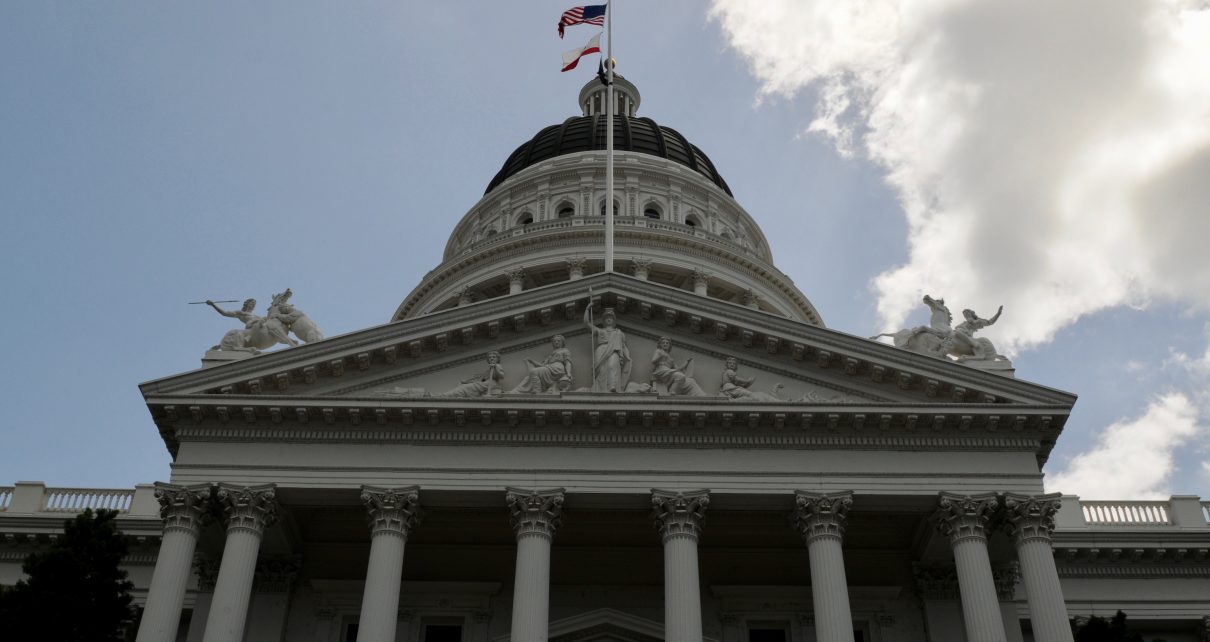
California State Capitol. (Photo: Kevin Sanders for California Globe)
House Antitrust Bills Have California’s $5+ Billion Tech Industry Concerned
‘These bills are business killers and abandon the Consumer Welfare standard of the antitrust laws’
By Katy Grimes, January 21, 2022 2:26 am
California’s tech industry supports two million jobs, and accounts for more than a quarter of America’s nearly $2 trillion Innovation Economy. That’s $2,000,000,000,000. California’s share is $500,000,000,000
There is a lot of talk throughout the country about reining in and breaking up “big tech” and social media companies. Now there are several proposed “antitrust” bills which the House Judiciary Committee recently approved addressing “anti-competitive abuses.”
Antitrust laws are also referred to as competition laws, and are statutes developed by the U.S. government to protect consumers from predatory business practices, and ensure fair competition exists. A monopoly is a market with the “absence of competition,” creating a situation where a specific person or enterprise is the only supplier of a particular thing.
According to the Silicon Valley Leadership Group, these bills are business killers and abandon the Consumer Welfare standard of the antitrust laws. They would:
- prohibit covered platforms from self-preferencing their products
- prohibit covered platforms from competing with platform users
- limit the ability of covered platforms from making acquisitions
- require covered platforms to make user data portable and interoperable
- prevent the venue transfer of state antitrust actions
According to those opposing these bills, of all of the states, California would be hurt the most.
A group of 30 very different California businesses recently sent a letter to California’s Congressional Delegation outlining their concerns: “We understand the need to ensure a competitive playing field within our markets, but these antitrust bills will have wide-reaching consequences for our innovation ecosystem in the Golden State and across the country, potentially handicapping our economic recovery efforts, harming consumers, and undermining our competitiveness in global markets. We join other business organizations in rejecting these harmful bills that would strip U.S. companies of their ability to deliver integrated consumer tools, ban mutually-beneficial startup acquisitions, and take steps toward breaking up our leading innovators.”
The Silicon Valley group says these antitrust bills are bad for California because the state’s tech industry, which not only supports the 2 million California jobs and $500 billion of America’s nearly $2 trillion Innovation Economy, the companies who provide these tools have proven a boon to the state economy, which saw a budget surplus exceeding $75 billion. They said the proposed bills would harm California by trying to break-up the largest companies that have contributed to the Golden State’s economic success.
There are also significant concerns that a breakup of this magnitude would give China the upper hand in technology over the United States.
A recent radio interview by John Reid on News radio WRVA in Richmond, VA of Asheesh Agarwal with the American Edge Project covered this antitrust legislation on tech companies, and whether it was necessary or not, or a good idea or not. Agarwal said while there are controversies and questions about some of the tech giants, “there is also the core story about their contributions of tens of billions of dollars into the economy, and to national security.”
Reid asked Agarwal if big tech companies can achieve and maintain a balancing act, or continue to manipulate people. Agarwal acknowledged the existing antitrust lawsuits against Google, Facebook and several others and said they will have to show the benefits to customers in a court of law.
“We can’t be so overzealous that we crush these companies,” Reid said. “But think about what was done with the telephone companies – AT&T, the Bell companies – they were all split up. Is that landmark event by which we judge how big a company should be and how much influence it should have, or are there new landmarks?”
Agarwal said the phone company break-up was a government created monopoly. “Today you have 5 or 6 very large companies. But they are competing vigorously with each other,” he added.
Reid discussed the bias against Conservatives on social media. “How do you balance freedom of speech with a big company that feels it must put in some protections for crazy speech in the public sphere?” he asked.
Agarwal, who served in the Bush and Trump administrations and on the Trump reelection team, said “by and large Conservatives do really well on Facebook, if you look at what pages are read the most and who is advertising there.”
“The other thing – we live in a free country. I won’t defend everything every tech company does at all. But these are private companies and they do have free speech rights of their own.”
Agarwal said the market is already responding. “You have new outlets popping up like Parler. Eventually market pressure is going to force some of these companies to recognize you need to have very objective criteria before you ‘de-platform’ tens of millions of Americans who might agree with the specific idea. But the beauty of our free market economy is you do have that ability for the market to adjust.”
The Silicon Valley Leadership Group added, “Additionally, the proposed antitrust bills improperly suggest that large companies inherently harm competition. In actuality, many small startups rely on larger companies because they provide the platforms and services that allow entrepreneurs to build products and markets.”
These are the bills:
H.R. 3843, the Merger Filing Fee Modernization Act of 2021
The Merger Filing Fee Modernization Act, introduced by Representative Joe Neguse (D-CO) and Victoria Spartz (R-IN), ensures that the Department of Justice and the Federal Trade Commission have the resources they need to enforce antitrust laws by increasing filing fees on the largest transactions while reducing filing fees on smaller transactions. The bill also ensures that the mergers that are most likely to consume agency time and resources pay more than those that place less of a burden on the agencies.
H.R. 3460, the State Antitrust Enforcement Venue Act of 2021
The State Antitrust Enforcement Venue Act, introduced by Antitrust Subcommittee Ranking Member Ken Buck (R-CO) and Antitrust Subcommittee Chairman David N. Cicilline (D-RI), ensures that state attorneys general who bring antitrust cases in federal court do not face delays or higher costs due to the transfer of such cases to a different venue.
H.R. 3849, the Augmenting Compatibility and Competition by Enabling Service Switching (ACCESS) Act of 2021
The ACCESS Act of 2021, introduced by Representatives Mary Gay Scanlon (D-PA) and Burgess Owens (R-UT), gives the Federal Trade Commission new authority and enforcement tools to establish pro-competitive rules for interoperability and data portability online.
H.R. 3826, the Platform Competition and Opportunity Act of 2021
The Platform Competition and Opportunity Act, introduced by Representative Hakeem Jeffries (D-NY) and Antitrust Ranking Member Ken Buck (R-CO), prohibits the largest online platforms from engaging in mergers that would eliminate competitors, or potential competitors, or that would serve to enhance or reinforce monopoly power.
H.R. 3816, the American Choice and Innovation Online Act
The American Innovation and Choice Online Act, introduced by Antitrust Subcommittee Chairman Cicilline (D-RI) and Representative Lance Gooden (R-TX), restores competition online and ensures that digital markets are fair and open by preventing dominant online platforms from using their market power to pick winners and losers, favor their own products, or otherwise distort the marketplace through abusive conduct online.
H.R. 3825, the Ending Platform Monopolies Act
The Ending Platform Monopolies Act, introduced by Representatives Pramila Jayapal (D-WA) and Lance Gooden (R-TX), authorizes the Federal Trade Commission and the Department of Justice to take action prevent dominant online platforms from leveraging their monopoly power to distort or destroy competition in markets that rely on that platform.
Our innovation ecosystem, which includes technology companies large and small, higher education, and our venture capital community, have delivered for our state and the rest of the nation.



